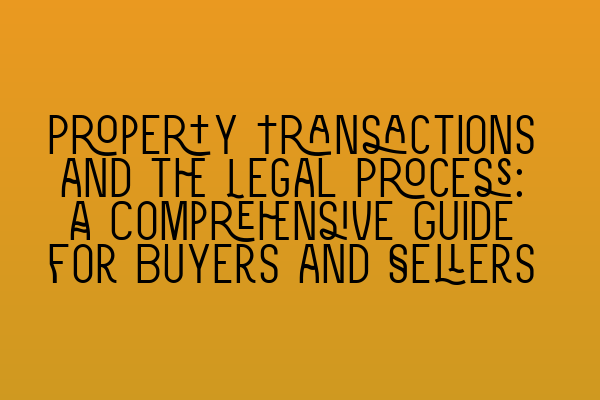Property Transactions and the Legal Process: A Comprehensive Guide for Buyers and Sellers
Welcome to SQE Property Law & Land Law! As an experienced solicitor, writer, and SEO expert, I am excited to provide you with a comprehensive guide to property transactions and the legal process for both buyers and sellers. Whether you are a first-time buyer or an experienced property investor, understanding the legal intricacies of property transactions is crucial to protect your interests and ensure a smooth process.
In this guide, we will cover the various stages of a property transaction, common legal requirements, and important considerations for buyers and sellers. So let’s dive in and explore the world of property law!
1. Pre-Contract Stage:
Before entering into a legally binding agreement, it is important to conduct thorough research and due diligence. As a buyer, you should consider obtaining a survey, conducting searches, and arranging finances. Sellers, on the other hand, should gather all relevant documents, including title deeds and planning permissions. For a detailed list of documents needed, refer to our article on SQE 1 Practice Exam Questions.
2. Negotiating the Contract:
Once both parties are ready to move forward, negotiations will begin to determine the terms and conditions of the contract. This includes the price, completion date, and any additional clauses such as fixtures and fittings. It is important to seek legal advice at this stage to ensure your interests are protected. Our SQE 1 Practice Mocks FLK1 FLK2 article provides practice materials to enhance your knowledge.
3. Exchange of Contracts:
The exchange of contracts is a pivotal moment in the property transaction. At this stage, the buyer will pay a deposit, and both parties become legally bound to complete the transaction. Should either party back out after this point, serious consequences may arise. It is essential to have a solicitor guide you through the process.
4. Completion and Post-Completion:
On the completion date, the buyer pays the remaining balance, and the seller hands over the keys. Post-completion, a variety of tasks must be undertaken, including notifying relevant parties of the change in ownership, updating authorities, and arranging insurance. For a more detailed overview of post-completion tasks, refer to our SQE 2 Preparation Courses article.
5. Special Considerations:
During the legal process, there are several special considerations that may apply, such as leasehold properties, shared ownership arrangements, and property in a conservation area. Each of these scenarios has its own set of legal requirements and implications. For an in-depth discussion on special considerations, we recommend our SQE 1 Preparation Courses article.
6. Seeking Legal Advice:
Throughout the property transaction, seeking legal advice is crucial to navigate complex legal issues and ensure a smooth process. An experienced solicitor will protect your interests, review contracts, conduct searches, and assist with any legal disputes that may arise. If you are unsure of SRA SQE exam dates, our article on SRA SQE Exam Dates is a helpful resource.
To sum it up, when it comes to property transactions and the legal process, knowledge is power. Understanding the stages, legal requirements, and seeking professional advice is imperative to protect your interests and achieve a successful outcome. We hope this guide serves as a valuable resource for both buyers and sellers.
If you have any further questions or require expert legal advice, please don’t hesitate to contact SQE Property Law & Land Law. Our team of experienced solicitors is here to assist you every step of the way. Happy property transactions!
